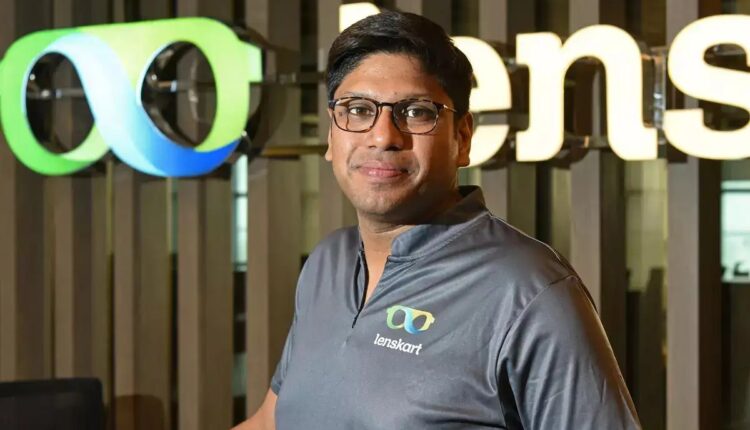The founder of India’s leading eyewear company is poised to reach billionaire status as his company prepares for one of the most anticipated public listings of the year. Peyush Bansal, the 41-year-old entrepreneur behind Lenskart Solutions Ltd., stands on the brink of achieving a major financial milestone through his company’s upcoming initial public offering.
Founded over 15 years ago through connections made on LinkedIn, Lenskart has transformed from a small startup into a multi-billion dollar enterprise that now dominates India’s eyewear market. The company’s success story represents a significant achievement in India’s startup ecosystem, particularly at a time when many technology companies have faced valuation challenges.
Major IPO Launch Targets $9 Billion Valuation
Lenskart IPO plans indicate the company will debut on Mumbai’s stock exchange as early as next month, with insiders suggesting a target valuation of approximately $9 billion. This ambitious pricing reflects investor confidence in the eyewear manufacturer’s business model and growth prospects.
Current calculations based on the IPO prospectus suggest Bansal’s stake could reach around $800 million after selling a portion of his shares during the public offering. Market analysts predict that if Lenskart shares experience a typical debut surge of about 25%, Bansal’s holdings could surpass the $1 billion threshold, officially making him a billionaire.
The timing of this Lenskart IPO comes as investor sentiment toward Indian consumer technology companies begins to recover after a challenging period marked by funding shortages and declining valuations.
Innovative Business Model Drives Success
The company has distinguished itself through its integrated approach to eyewear manufacturing and retail. Lenskart operates sophisticated robotic production facilities in India, utilizing advanced machinery imported from Germany to manufacture high-quality glasses. This technological edge, combined with an intuitive website that allows customers to order and test products remotely, has created a competitive advantage in the market.
Bansal’s vision extends well past India’s borders, with expansion plans already underway across Southeast Asia. The entrepreneur has identified similar demand patterns in Indonesia and Vietnam that mirror India’s market conditions from a decade ago, suggesting significant growth opportunities in these regions.
“India is the myopia capital of the world, and a lot of our people need glasses,” Bansal explained during a recent interview. “If we can solve that, everything else, including scale, profit and rising market capitalization, will follow.”
Strong Financial Performance Attracts Investors
Unlike many technology startups that prioritize growth over profitability, Lenskart achieved a significant milestone by reporting its first full-year profit in the fiscal year ending March 31. This financial achievement sets the Gurugram-based company apart from other Indian consumer-tech companies that have struggled with profitability.
The company’s diversified revenue streams include online sales, retail outlets, and international operations. As of March, Lenskart operated 2,723 stores across India and international markets including the Middle East and Southeast Asia. Notably, nearly 40% of its revenue now originates from markets outside India, demonstrating the success of its international expansion strategy.
Major investors have shown confidence in Lenskart’s long-term prospects. SoftBank Group Corp., which holds approximately 15% of the company, has described its investment as an example of patient capital willing to wait decades for compounding growth. Earlier this year, Fidelity Management & Research valued the company at $6.1 billion.
Future Plans and Market Position
The Lenskart IPO proceeds will fund several strategic initiatives designed to strengthen the company’s market position. Plans include opening new retail locations across India, investing in artificial intelligence capabilities, pursuing strategic acquisitions, and supporting general corporate expansion.
The company maintains control over nearly every aspect of its value chain, from lens design and manufacturing to final delivery. This vertical integration includes employing hundreds of ophthalmologists in Kolkata who provide remote eye consultations and developing AI-based testing tools to serve smaller cities with limited eye care access.
Looking ahead, Lenskart is betting heavily on smart eyewear technology. A dedicated 70-member team is working on integrating advanced features such as UPI payment systems, AI tools, cameras, and headphones into their products. However, Bansal maintains a cautious approach to this emerging market, emphasizing that timing remains crucial for success.
The company is also addressing supply chain diversification, as it currently depends on China for more than one-third of its purchases, including frames, molds, and raw materials. To reduce this dependency, Bansal is overseeing construction of a new manufacturing facility in Hyderabad, expected to become the world’s largest eyewear production center covering 50 acres with capacity to produce hundreds of thousands of glasses daily.


